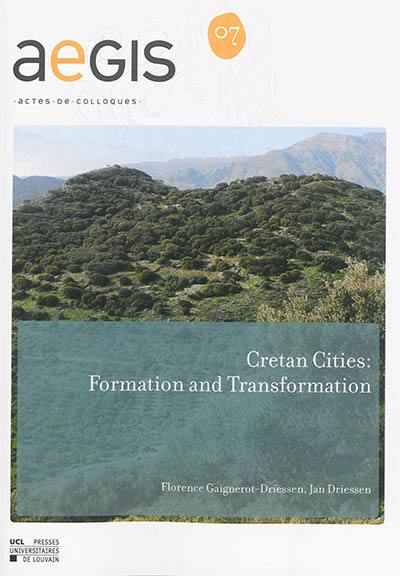
Fiche technique
Format : Broché
Nb de pages : 182 pages
Poids : 400 g
Dimensions : 21cm X 30cm
ISBN : 978-2-87558-328-4
EAN : 9782875583284
Cretan cities
formation and transformation
Quatrième de couverture
This volume
This volume brings together a series of papers reflecting a number of lectures given at the Université catholique de Louvain (UCL) in 2010-2012 in the frame of a seminar entitled La naissance des cités crétoises. Eight Cretan sites (Axos, Phaistos, Prinias, Karphi, Dreros, Azoria, Praisos, and Itanos), recently excavated or re-excavated, are considered in their regional and historical context in order to explore the origin and early development of the Greek city-state on the island.
The editors
Florence Gaignerot - Driessen's work focuses on the formation process of the polis on Crete and the definition of social groups in Aegean protohistory. She is involved in archaeological projects at Sissi, Dreros, and Anavlochos and currently teaches ancient history and archaeology at the University of Picardie (Amiens). Jan Driessen is Professor of Greek Archaeology at UCL and is a spécialist of Minoan Grete. He co-directed excavations at Palaikastro and Malia, and since 2007 he has directed excavations at the Minoan site of Sissi. Together they collected and edited contributions by Eva Tegou (25th Ephorate of Prehistoric and Classical Antiquities), Daniela Lefèvre-Novaro (University of Strasbourg), Antonella Pautasso (Institute of Archeological Heritage, Monuments and Sites/National Research Council), Saro Wallace (British School at Athens), Vasiliki Zographaki (24th Ephorate of Prehistoric and Classical Antiquities) and Alexandre Farnoux (French School in Athens). Donald Haggis (University of North Carolina at Chapel Hill), James Whitley (University of Cardiff), Didier Viviers and Athéna Tsingarida (Free University of Brussels).
The series AEGIS (Aegean Interdisciplinary Studies) attempts to make the results of new archaeological research on Aegean and especially Minoan societies available to the scientific and wider public at a rapid pace. Monographs. PhD dissertations, proceedings of scientific meetings and excavation reports complete each other to offer a general view of this time frame which is of primary importance to understand the ancient world and its historical, political, symbolical and social sequences.





